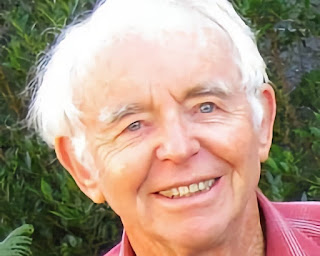Professor Brian Hardaker has died. Professor Sunjana Adapa prepared this obituary that I have taken the liberty of repeating in full.
New England, Australia
Saturday, October 21, 2023
New England Passings - Brian Hardaker
Professor Brian Hardaker has died. Professor Sunjana Adapa prepared this obituary that I have taken the liberty of repeating in full.
Monday, October 10, 2022
Oaky Hydro Electric site for sale
Essential Energy has placed the 214ha Oaky Hydro site on the market. The sales pitch suggests that there is a 2,700 ML dam restoration opportunity with a Hydropower Station connected to the network with a 8.2 km frontage to Oaky River.
The Commercial Real Estate advertisement for the sale (here) includes a range of photographs, while a 19 September 2022 story by Caroline Riches, Oaky River hydro site offers rare opportunity provides additional information.
During the 1950s, Albanian civil engineer Zihni Buzo designed and oversaw the implementation of the dam and hydropower scheme here, which supplied renewable energy to the local area from 1956 until 2013, when severe flooding burst the banks and damaged the infrastructure. The Wayback Machine includes the report on the events surrounding the flood event of 23 February 2013. The damage was never repaired.
Zihni, father to playwright Alex Buzo, was a visionary man who saw the Oaky Scheme as a first step in broader hydro and water development including pumped hydro. While the scheme was not large by today's standards it was all very exciting. Aunt Margaret worked in the Thiess office, Thiess were handling constriction, while Zihni took us all to the site to show us the works in progress.
The costs of construction added to power bills. By the time of the abolition of the county councils in 1995, the amortisation of the original costs by the New England County Council was flowing through in below average electricity prices. These gains now vanished. I have always felt, perhaps wrongly, that the the troubles that befell Oaky were one of the collateral costs of the 1955 Sydney electricity heist. Perhaps now we might see the scheme reborn.
Monday, June 06, 2022
It's been bloody wet on the the New England!
As I write it's cold and blowy. That plus cloud has kept the frosts away. The ground is sodden from the constant rain. As the ABC's Lara Webster reports in Northern New South Wales farmers see their wettest conditions in decades as rain keeps falling, this is the third year in a row of above average rainfall.
It's now hard to remember the previous drought, but the effects are still there. This year's autumn show was much less spectacular than in previous years because the trees are still feeling the impact of the long drought. Many trees died, others carry dead branches, while some have simply fallen over under the impact of rain and wind.
Sunday, January 16, 2022
Covid adds to the case for New England statehood
With just three posts last year, this blog has been in sad decline! The combination of personal circumstances with covid has had a devastating effect. It’s not that I had covid, just that covid made life very disruptive and difficult.
Two posts this year on my personal blog (Covid woes - further failures in public policy, Covid woes - virtual lockdowns) look very briefly at covid policy issues from a personal perspective. Covid has demonstrated the continuing importance of the states. It has also provided very tangible evidence of the continued importance of our fight for New England self-government.
Because we don’t exist in a formal sense, because we have no power, the covid measures that might have protected us, that might have allowed us to manage, were simply swamped in that blancmange called NSW. We do need our own state.
Wednesday, October 13, 2021
New England travel wish list: visiting Comboyne
I have never been to Comboyne or its surrounding plateau. Many years ago after my father retired he took mum on a series of road trips including three days on the Comboyne Plateau. He came back praising its beauty.
I was reminded of all this by a story on ABC Comboyne locals rally to revitalise their mountain-top town after trifecta of drought, bushfires, floods. It's a story of recovery in the face of isolation and natural disaster.
Comboyne lies to the south west of Port Macquarie, north west of Taree. It's a bit over three hours from Armidale by road. Definitely time for me to visit!
Tuesday, January 05, 2021
Greens to preselect candidate for Richmond
Saturday, January 02, 2021
Hopefully resuming posting
I hope that you had a happy Christmas.
It's been slim pickings on this blog over the last twelve months with only nine posts. There have been particular reasons for that including time pressure on other projects. Some of those reasons I will explore here later. Hopefully I will do better this year
Thursday, November 05, 2020
New England Renewable Energy Zone - projects in progress
Back on 10 July 2020, the NSW Government announced that the New England Tablelands would become a NSW powerhouse, with a NSW Government $79 million plan to develop a second, massive 8,000 MW Renewable Energy Zone (REZ) in the region.
Tuesday, September 01, 2020
Calling those interested in tree change: Armidale based NERAM Launches "Come run our café" campaign.
The New England Regional Art Museum is now calling for applications from hospitality professionals with an outstanding culinary vision to operate the onsite cafe and has today launched the “Come run our café” campaign and video.
Thanks to the generous donation from Bruce and Rose McCarthy, the café has undergone renovations with a brand-new commercial kitchen now in place and an equipment fit out soon to come. The newly refurbished space will be ready at the end of September and we are now looking for fresh talent to become the operators.
Our NERAM community knows how important the success of the café is to providing an outstanding visitor experience at the Museum. A great museum that offers a great dining experience creates a cultural and culinary destination and we think that the NERAM café has infinite potential.
Expressions of interest to be the café operator close on October 15th 2020. You will find details here.
The above comes from the official NERAM release, but is actually fairly dry. What is it about NERAM that makes this an an attractive proposition? Why do we need you, people with skills and flair? Let me explain.Armidale is a university city with a population of 23,000. It offers superb educational facilities, a varied life style combining metro and country, NBN to the premises connections, more sporting facilities that you can (to use an old phrase) poke a stick at.
Armidale has more writers, artists, publishers and intellectuals per head than any equivalent city in the country. This leads to a vibrant intellectual life.
Within Armidale, NERAM has a special place as the repository of some of Australia's greatest art collections including the Hinton and Coventry collections. It's openings and facilities are an integral element in city life.
Interested? Then let's look at some nuts and bolts.
If you take on the challenge, you have two key markets.
Armidale autumn scene
The first and largest is the local and regional population who come to NERAM for openings, festivals such as the Black Gully Festival or just for breakfast, lunch or coffee. The second is the visitors who come from out of town as tourists, to visit family or for particular activities and who stay for a coffee or a meal.
This includes a significant event component, making catering a major potential source of revenue.
If all this sounds good, what might go wrong? A bit, actually.
To begin with, and as you might expect given my description of the city, Armidale has a large number of reasonable coffee and food places.
As part of the museum precinct, NERAM is about a mile from the city centre. No foot traffic. While you will get some traffic from NERAM visitors, you will have to work to get locals to come to you. This will take time.
You will also need to work with NERAM and with other bodies including the University to get people to come for events and occasions. The University has its own competitive facilities on campus, but will still cooperate in terms of special events.
I suppose in all this that the biggest question is just how you to define your competitive edge. How do you build on the facilities and location that you have? I suppose, and this is based on my own experience, that you localise and regionalise. The region has a plethora of wine and produce. Why not sell that as well?
I am not an expert in hospitality, but I do think that this option now presented is worth a serious look!
Friday, May 29, 2020
Musings on the end of New England's local and regional media
I hope that this break in printing might actually force us to ask what we want from our papers, to challenge the papers and especially management on the service they provide, to answer the question why they are important to us. I accept that this is naive view, but I am tired of managements that treat papers as simply another masthead.Following that post, we learned that as part of its changes, ACM had closed the Express office in Armidale. It had been the Express office since the early part of the twentieth century. To recover capital, Fairfax had sold the office in 2015. The office was sold on the basis of a secure lease to 2019 plus 3 x 5 year options until 2034. Now the office was unceremoniously exited. The local historical society managed to save some of the bound back copies now stored in the meeting room.
On 18 May 2020 in a post on my history blog I provided a consolidated list of posts on the history and changing role of the media in Australia's New England. In that post I also mentioned that I was writing a series of columns on the history of the New England media. These will start to come up shortly.
In my 17 April post I mentioned the suspension by News Corp of publication of most of its community and regional media. Now the company has announced the next stage of restructuring. The following table provides details of New England newspapers that will now be digital only or have ceased publication entirely.
Tweed Daily News
|
Digital only
|
Ballina Advocate
|
Digital only
|
Byron Shire News
|
Digital only
|
Coffs Coast Advocate
|
Digital only
|
Grafton Daily Examiner
|
Digital only
|
Lismore Northern Star
|
Digital only
|
Newcastle News
|
Digital only
|
Coastal Views
|
Ceasing publication
|
Northern Rivers Echo
|
Ceasing publication
|
Richmond River Express
Examiner
|
Ceasing publication
|
Warwick Daily News
|
Digital only
|
Stanthorpe Border Post
|
Digital only
|
I am not blind to the challenges posed by evolving computer and communications technologies including most recently the internet. On and off I have been writing about it since the 1980s. However, I am also very conscious about the ways in which the metro centred corporates with their focus on maximising gains or minimising losses across empires have effectively destroyed the ethos of the country press including the capacity of papers, radio and TV to provide a broader regional voice. In so doing, they have eroded the loyalty of the very audiences on which their commercial survival depends.




















